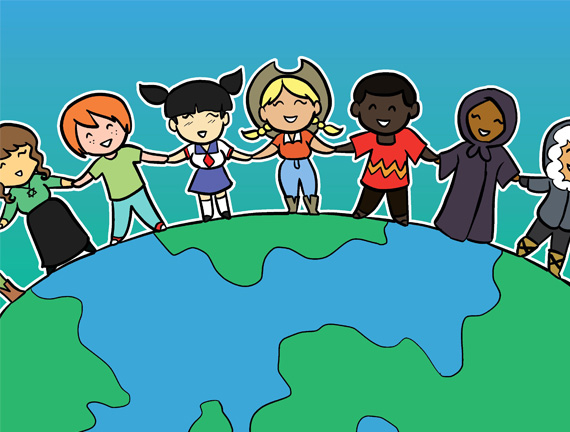
.png) Robert Clements
Robert Clements

Cultural diversity is a fact of modern life and it exists now in practically all countries of the world. In addition to conventional elements such as race, religion and language, cultural diversity is accentuated by new factors including globalization, the breakdown of the traditional moral consensus, the emphasis on individual choice regarding issues like the place of religion in public life, family discipline, relations between parents and children and other aspects of life today.
Cultural diversity is at the root of most conflicts, tensions and uncertainties in the contemporary world. Some have attributed the present "international insecurity" to the Clash of Civilizations whilst others advocate dialogue of religions and cultures to prevent such conflicts and bitterness. In 2001, the General Assembly of the United Nations adopted the Global Agenda for Dialogue among Civilizations and the UNESCO endorsed the International Declaration on Cultural Diversity.
A common assumption inspires both covenants. A multicultural society needs to find ways and means to accommodate diversity without loosing its cohesiveness and unity. Two approaches are rejected. Assimilation which requires minorities to abandon their own distinctive institutions, cultures and values to merge into the prevailing culture is to be avoided. This way is sociologically unlikely to succeed and is morally untenable in view of people's deep adherence to normative values such as religion. Similarly, unbounded multiculturalism which entails giving up the concept of shared values and identity in order to privilege ethnic and religious differences presuming that a nation can be replaced by a number of diverse minorities is unacceptable. Such a course of action usually results in undemocratic backlash, support for extremist parties, populist leaders and anti-minority policies. It is morally unjustified as it does not accept the values and institutions upheld by society at large. Regions that break away from democratic societies hoping to achieve a larger measure of self-government are not likely to enhance self-government and may rather weaken it.
Cultural pluralism values diversity and implements policies of inclusion that cater to the requirements of all groups. The sensitivities of the minorities as well as of the majority need attention. Fundamental rights and fundamental freedoms of all are to be protected. The rights of the weaker sections are particularly important in a society that respects cultural pluralism.
Intercultural dialogue is necessary both at the national and at the global levels so that contentious issues are resolved amicably. The more a nation harmonizes differences at home the greater is its ability to contribute to dialogue at the international level. Stronger the cooperation and goodwill among nations lesser the need to spend huge resources on arms and military strategies.
Education has a crucial role to play in providing ethical and spiritual value systems that facilitate understanding of other cultures and civilizations. The UNESCO Constitution begins with the words "Since wars begin in the minds of men it is in the minds of men that the defences of peace must be constructed". Education ought to promote tolerance, respect for diversity and friendship among peoples and nations. Educational institutions must be provided with a learning environment which contributes to tolerance, understanding and respect for diversity. They should be protected from teachings that promote extremism, intolerance and violence.
Goa has made significant progress in the field of education over the last 50 years. This is mainly due to Government aided and private institutions. Government schools themselves are in an appalling condition. Attendance at several Government primary schools which I visited over the last few years was almost 100 percent but in the circumstances in which most of them function, there is not much learning to be done. Four classes are often taught simultaneously in one classroom and in some cases eight classes in two languages. There are no black boards or they are not repaired, rice bags (for the mid-day meal), discarded furniture, school records, etc are all bundled together in the same classroom along with the children. The teachers in Government schools are as hard working and the students are as bright and intelligent as their counterparts in private schools. What is lacking is the minimum infrastructure. As a result all those who can afford enrol their children in private schools. The children in Government primary schools come from the poorer sections of society and their parents are usually illiterate. These students require special attention but on the contrary they get no attention at all. Government primary schools have suffered from what might be called a “social attention deficit”, a sheer lack of attention and concern by the community at large including policymakers at all levels.
India is home to diverse languages, religions, races and lifestyles. It is a vast country where questions of unity and diversity interplay. Yet, India emerges with an excellent record at managing diversity. This makes it possible to survive as a nation and to move ahead as the largest democracy in the world. The Constitution of India ensures that all citizens have equal rights and should have an equal opportunity. In particular, the principle of secularism enshrined in our Constitution is the best method to accommodate religious diversity and could be emulated across the globe. In a multicultural society, the State cannot be identified with any religious or cultural group and it should either be neutral or even handed in its approach to all such groups. Unity in diversity is the highest possible civilizational attainment. It is made possible through respect for choice in an atmosphere of mutual trust.
(The writer is a former Union Minister)
(Published on 31st August 2020, Volume XXXII, Issue 36)